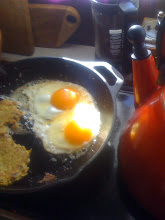Eggs are a staple at our house. We eat them for breakfast, we add them to soups, we bake with them--especially useful to make up for the baking properties of the gluten we don't eat. So, of course, the quality of these eggs is incredibly important. I always strive to find the best sources of each food that we eat, but deciding what is actually best is not so simple. For a while in the U.S. we accepted that "organic" meant "best" as far as food went. But recently we have been asking more questions: is it more responsible to choose locally produced food? What if that local food is pesticide laden? What if my local farmer grows food organically but chooses not to become certified? What does organic mean now, with watered-down standards in place? And animals can be fed organic feed and still be confined in barns and/or cages. Does free-range trump organic? Does free-range mean anything that we can actually pin down? Some of the labels we see have amounted to greenwashing, the use of a "green" term that has no teeth enforcing it--it sounds good, but means little.
So, as far as the eggs go, we are confronted with a confusing array of choices: free-roaming or cage free (they are not in cages but may be confined to a barn without any sunlight, despite claims of "access to the outdoors"--that's a small open door somewhere that the chickens don't know to use), organic (given feed without pesticide, no hormones or antibiotics), vegetarian (exclusively grain-fed), high omega 3 (fed a supplement, usually flax, to boost omega 3 fatty acids). Some of these eggs come in cartons decorated with folk motifs or have brand names that sound like they are from a small farm. But most of this hype is just that, worthless marketing. Because chickens are omnivores. Left to their own devices, they will happily roam around outdoors, scratching for bugs and worms, nibbling plants, eating seeds, absorbing sunlight. The eggs from truly pastured chickens have substantial shells, unlike the frail ones from the battery eggs in the supermarket--this reflects the higher mineral content of their diet. The yolks of the eggs are a deep yellow, sometimes orange, showing the fat soluble vitamins (such as A, D, E, K) that the chickens synthesize from their diverse diet and from the sun. (See this article for more on the nutrient content of pastured eggs.) And the eggs taste eggy, real.
Yo
 u may not really know what I mean by that until you have the chance to try a real egg. We have eaten many eggs over the last few years, but the best were from S's farm this summer. They were lovely to look at and absolutely delicious. The chickens have the run of the farm, and have new digs for laying, built by the apprentices this summer. They pay for their keep by keeping the bug population down--and of course, by giving the prized eggs. Here in Miami we have a few choices: good organic/high omega eggs from Delicious Organics which are in good supply; eggs raised locally using a "chicken tractor" from Bee Heaven Farm-- sold by shares ,which go fast; and our newest option, delivery of pastured eggs from farms from further north in Florida. Some of these eggs come close to S's eggs--orangey/yellow yolks, deep eggy flavor, shells that don't crumble when they are cracked.
u may not really know what I mean by that until you have the chance to try a real egg. We have eaten many eggs over the last few years, but the best were from S's farm this summer. They were lovely to look at and absolutely delicious. The chickens have the run of the farm, and have new digs for laying, built by the apprentices this summer. They pay for their keep by keeping the bug population down--and of course, by giving the prized eggs. Here in Miami we have a few choices: good organic/high omega eggs from Delicious Organics which are in good supply; eggs raised locally using a "chicken tractor" from Bee Heaven Farm-- sold by shares ,which go fast; and our newest option, delivery of pastured eggs from farms from further north in Florida. Some of these eggs come close to S's eggs--orangey/yellow yolks, deep eggy flavor, shells that don't crumble when they are cracked.Now that I have great eggs, I have to work on finding the best pastured pork belly, because I sure do miss the smell of our home-cured bacon in the mornings . . .






No comments:
Post a Comment